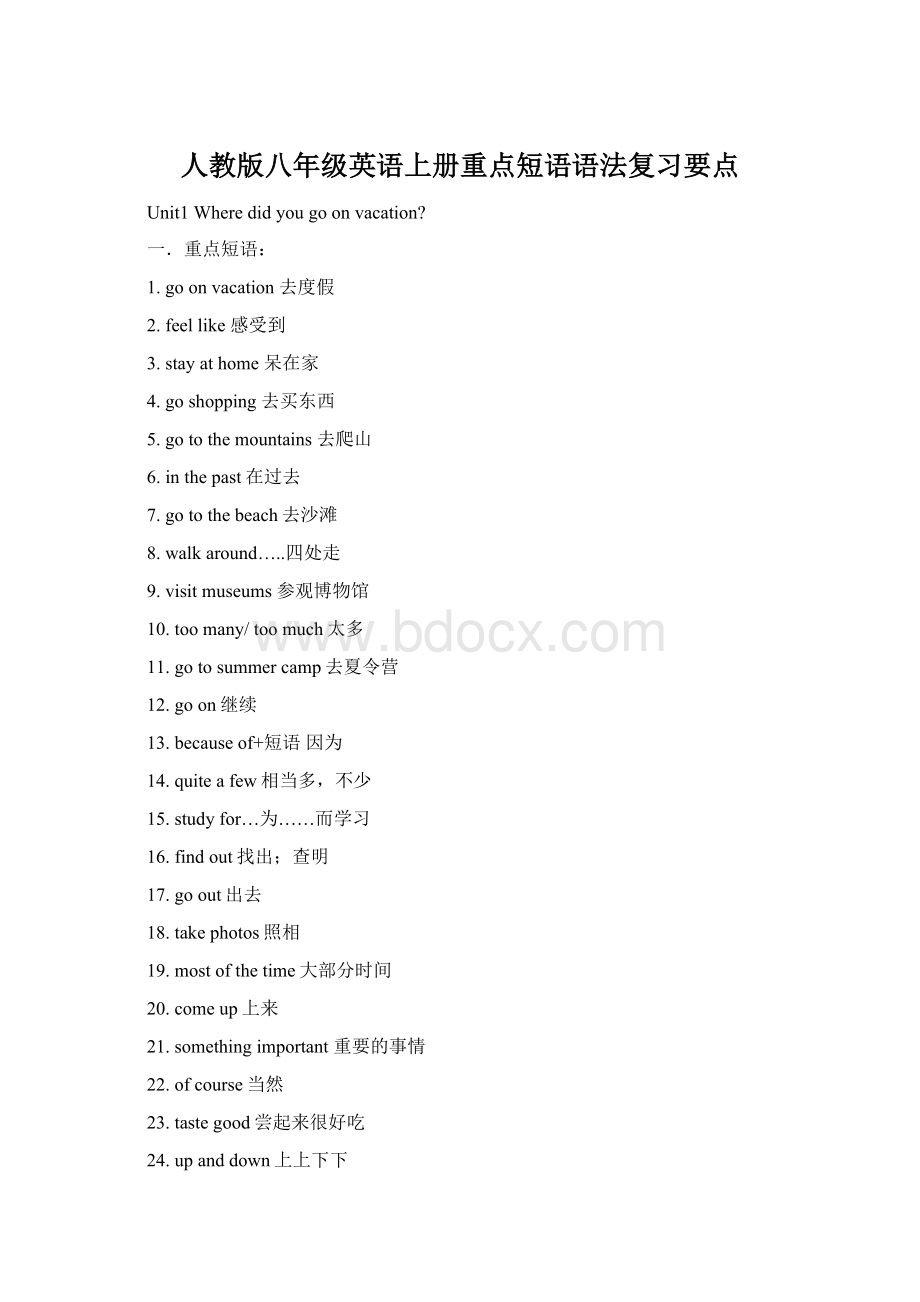人教版八年级英语上册重点短语语法复习要点Word文档格式.docx
《人教版八年级英语上册重点短语语法复习要点Word文档格式.docx》由会员分享,可在线阅读,更多相关《人教版八年级英语上册重点短语语法复习要点Word文档格式.docx(29页珍藏版)》请在冰豆网上搜索。

7.trydoingsth.尝试做某事trytodosth.尽力做某事
tryone`sbesttodosth尽力做某事
8.look+adj.看起来……
9.forgettodosth.忘记去做某事
forgetdoingsth.忘记做过某事
10.enjoydoingsth.喜欢做某事
11.wanttodosth. 想去做某事
12.startdoingsth.开始做某事
13.stopdoingsth.停止做某事
stoptodosth停下来做某事
14.keepdoingsth.继续做某事
15.dislikedoingsth.不喜欢做某事
16.Whynotdo.sth.?
为什么不做……呢?
17.so+adj+that+从句如此…以至于
18.tellsb.(not)todosth.告诉某人(不要)
三.词语辨析:
1.anywhere与somewhere两者都是不定副词。
①anywhere在任何地方,常用于否定句和疑问句中。
②somewhere在某处,到某处,常用于肯定句。
Ican’tfinditanywhere.
Ilostmykeysomewherenearhere.
2.seem+形容词看起来…..Youseemhappytoday.
seem+todosth.似乎、好像做某事
Iseems/seemed+从句看起来好像…;
似乎….
seemlike….好像,似乎…..
Iseemtohaveacold.Itseemsthatnoonebelieveyou.
Itseemslikeagodidea.
3.decidetodosth.决定做某事
decide+疑问词+动词不定式
Theydecidetovisitthemuseum.
Hecannotdecidewhentoleave.
4.startdoingsth=starttodosth.开始,可与begin互换。
Hestarteddoinghishomework.
5.overprep.多于,超过,在…以上(表示数目、程度)
=morethanMyfatherisover40yearsold.
6.toomany太多,后接可数名词复数:
toomuch太多,修饰不可数名词,修饰动词作状语。
Motherboughttoomanyeggsyesterday.
Wehavetoomuchworktodo.Don’ttalktoomuch.
7.because连词,因为,引导状语从句,表示直接明确的原因或理由。
becauseof因为,由于,后接名词、代词或动名词,不能接句子。
Idon’tbuytheshirtbecauseitwastooexpensive.
Hecan’ttakeawalkbecauseoftherain.
8.too,…to 太….以至于不能….
Motheristootiredtogotoschool.
9.havefundoingsth 享受做某事的乐趣
四.重点语法:
1.—Wheredidyougoonvacation?
—IwenttoNewYorkCity.
2.—Didyougooutwithanyone?
—No,Noonewashere.Everyonewasonvacation.
3.—Didyoubuyanythingspecial?
—Yes,Iboughtsomethingformyfather.
4.—Howwasthefood?
—Everythingtastedreallygood.
5.—Dideveryonehaveagoodtime?
—Oh,yes.Everythingwasexcellent.
Unit2Howoftendoyouexercise?
1.helpsbwithsth帮助某人做某事
helpwithhousework帮助做家务
2.goshopping去买东西
3.onweekends在周末
4.howoften多少次
5.hardlyever几乎从不
6.onceaweek每周一次
7.twiceamonth一个月两次
8.gotothemovies/cinema/gotoseethefilm去看电影
9.everyday每天
10.usetheInternet用互联网
11.befree=benotbusy=havetime有空
12.havedanceandpianolessons上舞蹈和钢琴课
13.swingdance摇摆舞
14.playpingpong打乒乓球
15.playtennis打网球
16.stayuplate熬夜;
睡得很晚
17.atleast至少
18.gotosleep睡觉
19.gotobedearly早点睡觉
20.gotobed上床睡觉
21.suchas比如;
诸如
22.playsports做运动
23.begoodfor对……有好处
24.begoodatdoingsth 擅长做某事
25.gocamping去野营
26.not…atall一点儿也不……
27.inone’sfreetime在某人的业余时间里
28.themostpopular最受欢迎的
29.suchas例如….像….这样
30.oldhabitsdiehard积习难改/旧习难改
31.gotothedentist看牙科医生
32.mornthan多于;
超过
33.lessthan少于
34.junkfood垃圾食品
35.takecareofsb照料某人lookaftersb照顾某人
36.havetodosth必须做某事
37.getin…进入…
38.belatefor迟到
1.helpsb.withsth=havesbdosth帮助某人做某事
2.wantsb.todosth.让某人做某事
3.Howaboutdoing…?
怎么样?
/….好不好?
4.Howmany+可数名词复数+一般疑问句有多少…..
5.主语+find+that从句发现…
6.It’s+adj.+todosth.做某事是….的
7.spendtimewithsb.和某人一起度过时光
8.asksb.aboutsth.向某人询问某事
9.bydoingsth.通过做某事
10.What’syourfavorite…..?
你最喜欢的…是什么?
11.startdoingsth.开始做某事
12.thebestwaytodosth.做某事的最好方式
13.befullof满的
14.whataboutdoingsth?
做某事怎么样?
15.not….atall一点儿也不
Idon`tlikeitatall.我一点儿也不喜欢它。
1.howoften多久一次,用来提问动作发生的频率。
回答用:
once,twice,threetimes等词语。
Howoftendoyouplaysports?
Threetimesaweek.
howlong多长,用来询问多长时间,也可询问某物有多长。
HowlongdoesittaketogettoShanghaifromhere?
Howlongistheruler?
howfar多远,用来询问距离,指路程的远近。
Howfarisitfromheretothepark?
It’sabout2kilometers.
2.Howcome?
怎么回事?
表示某件事情很奇怪,有点想不通;
可单独使用,也可引导一个问句,相当于疑问句why,但howcome开头的特殊疑问句使用的仍然是陈述语序。
HowcomeTomdidn’tcometotheparty?
=Whydidn’tTomcometotheparty?
3.free空闲的,有空的,反义词为busy.
befree有空,闲着,相当于havetime.还可作“免费的、自由的”解。
befreetodosth.自由地做某事。
I’llbefreenextweek.=I’llhavetimenextweek.
Theticketsarefree.You’refreetogoortostay.
4.stayup指“熬夜,不睡觉”。
stayuplate指“熬夜到很晚,迟睡”。
Hestayedupallnighttowritehisstory.
Don’tstayuplatenexttime.
5.gotobed强调“上床睡觉”的动作及过程,但人不一定睡着。
Iwenttobedatelevenlastnight.
gotosleep强调“入睡,睡着,进入梦乡”。
Shewassotiredthatshewenttosleepsoon.
6.find+宾语+名词,发现:
Wehavefoundhim(tobe)agoodboy.
find+宾语+形容词,发现:
Hefoundtheroomdirty.
find+宾语+现在分词,发现:
Ifoundherstandingatthedoor.
7.percent百分数,基数词+percent:
percent没有复数形式,作主语时,根据所修饰的名词来判断谓语的单复数。
Thirtypercentoftimepassed.
Fortypercentofthestudentsinourclassaregirls.
8.morethan超过,多于,不仅仅,相当于over.
反义词组为:
lessthan.
IlivedinShanghaiformorethan/overtenyears.
9.afraidadj.担心的,害怕的,在句中作表语,不用在名词前作定语。
beafraidofsb/sth害怕某人/某事;
beafraidofdoingsth.害怕做某事
I’mafraid+从句,恐怕,担心:
I’mafraidwecan’tcomehereontime.
I’mafraidIhavetogonow.
Somechildrenareafraidofthedark.
Don’tbeafraidofaskingquestion.
10.sometimes,sometime,sometimes,sometime的区别:
①sometimes频度副词,有时。
表示动作发生的不经常性,多与一般现在时连用,可位于句首、句中或句末。
SometimesIgetupveryearly.
---Howoftendoyougetup?
②sometime副词,某个时候。
表示不确切或不具体的时间,常用于过去时或将来时,对它用疑问词when.
IwillgotoShanghaisometimenextweek.
---WhenwillyougotoShanghainextweek?
③sometimes名词词组,几次,几倍。
其中time是可数名词,对它提问用howmanytimes.
Ihavereadthestorysometimes.
---Howmanytimeshaveyoureadthestory?
④sometime名词短语,一段时间.表示“一段时间”时,句中谓语动词常为延续性动词,提问时用Howlong.
I’llstayhereforsometime.Howlongwillyoustayhere?
四.重点语法:
1.Whatdoyouusuallydoonweekends?
Ialwaysexercise.
2.Whatdotheydoonweekends?
Theyoftenhelpmymotherwithhousework.
3.Whatdoesshedoonweekends?
Shesometimesgoesshopping.
4.Howoftendoyougotothemovies?
Igotothemoviesmaybeonceamonth.
5.HowoftendoeshewatchTV?
HehardlyeverwatchesTV.
6.Doyougoshopping?
No,Inevergoshopping.
Unit3.I’mmoreoutgoingthanmysister.
1.moreoutgoing更外向
2.as…as…与……一样……
3.thesingingcompetition唱歌比赛
4.besimilarto与……相像的/类似的
5.thesameas和……相同;
与……一致
6.bedifferentfrom与……不同
7.careabout关心;
介意
8.belikeamirror像一面镜子
9.themostimportant最重要的
10.aslongas只要;
既然
11.bringout使显现;
使表现出
12.getbettergrades取得更好的成绩
13.reachfor伸手取
14.infact事实上;
实际上
15.makefriends交朋友
16.theother其他的
17.touchone’sheart感动某人
18.betalentedinmusic有音乐天赋
19.begoodat擅长……
20.begoodwith善于与……相处
21.havefundoingsth.享受做某事的乐趣
22.begoodatdoingsth擅长做某事
23.makesb.dosth.让某人做某事
24.wanttodosth.想要做某事
25.as+adj./adv.的原级+as与……一样……
26.It’s+adj.+forsb.todosth.
做某事对某人来说是……的
二.词语辨析:
1.laughv.&
n.笑;
笑声laughat嘲笑
Wealllaughedloudlywhenshemadeajoke.她说了个笑话,我们都大声笑起来。
Wealllaughedathisjoke.听了他的笑话我们都笑起来。
Helaughsbestwholaughslast.不要高兴得太早。
Don’tlaughathim.别嘲笑他。
Peoplehaveoftenlaughedatstoriestoldbyseamen.人们常常嘲笑海员所讲的故事。
Everyonelaughedathisfoolishantics.大家都笑他那种愚蠢的滑稽动作。
Wehadagoodlaughathisjoke.我们被他的笑话逗得哈哈大笑。
2.thoughconj.虽然;
纵然;
即使;
尽管=although
thoughadv.不过,可是,然而,常用于句末,用逗号隔开。
Thoughitwasraining,hewentthere.虽然当时正下着雨,他还是到那里去了。
Thoughhewaspoorhewashappy.虽然他很穷却很快乐。
注意:
在though引导的从句后不使用but。
如:
Thoughhewaspoor,buthewashappy.(误)
Jimsaidthathewouldcome,hedidn’t,though.
三.重点语法:
1.—IsTomsmarterthanSam?
—No,heisn’t.SamissmarterthanTom.
2.—IsTaramoreoutgoingthanTina?
—No,sheisn’t.TinaismoreoutgoingthanTara.
3.Areyouasfriendlyasyoursister?
No,I’mnot.I’mfriendlier.
4.DoesTaraworkashardasTina?
Yes,shedoes.
5.Who’smorehardworkingatschool?
Tinathinkssheworksharderthanme.
形容词和副词的比较级、最高级:
大多数形容词和副词有三个等级:
1)原级(不作比较),修饰词very,so,too,pretty,really2)比较级,表示“较……”或“更……”的意思(两者之间进行比较),标志词than,AorB,ofthetwo,修饰词much,alot,alittle;
3)最高级,表示“最……”的意思(三者或三者以上作比较),形容词最高级前面一般要加定冠词the,后面可带in(of)短语来什么比较的范围。
形容词和副词的比较级和最高级规则变化:
构成方法
原级
比较级
最高级
单音
节词
和部
分双
音节
词
一般在词尾加-er或-est
high
short
higher
shorter
highest
shortest
以字母e词尾的词,加-r或-st
late
fine
later
finest
latest
finest
重读闭音节词词尾只有一个辅音字母时,先双写辅音字母,再加-er或-est
hot
big
thin
fat
hotter
bigger
thinner
fatter
hottest
biggest
thinnest
fattest
以“辅音字母+y”结尾的双音节词,先把“y”改为“i”,再
加-er或-est
funny
easy
early
funnier
easier
earlier
funniest
easiest
earliest
多音节词和部分双音节词
在词前加more或most
beautiful
athletic
outgoing
morebeautiful
moreathletic
moreoutgoing
mostbeautiful
mostathletic
mostoutgoing
形容词和副词的比较级和最高级不规则变化:
原级
比较级
最高级
good/well
better
best
bad/badly
worse
worst
many/much
more
most
little
less
least
far
farther(更远)
further(更深远)
farthest(最远)
furthest(最深远)
as…(原级)as与……一样……notas/so…as不如
LimingisastallasJim.JackrunsasfastasTom.
Lilyisnotas/sotallasLucy.=LilyisshorterthanLucy.
Unit4What’sthebestmovietheater?
1.movietheater电影院
2.closeto…离……近
3.clothesstore服装店
4.intown在镇上
5.sofar到目前为止
6.mi